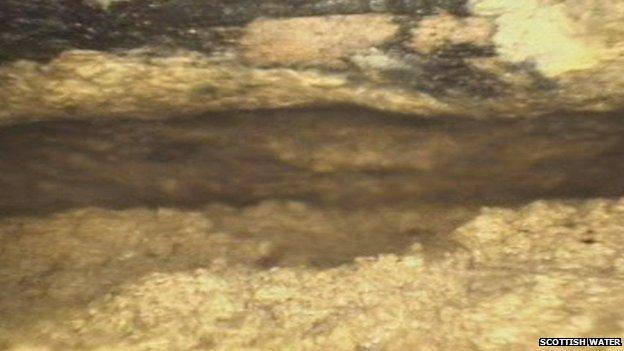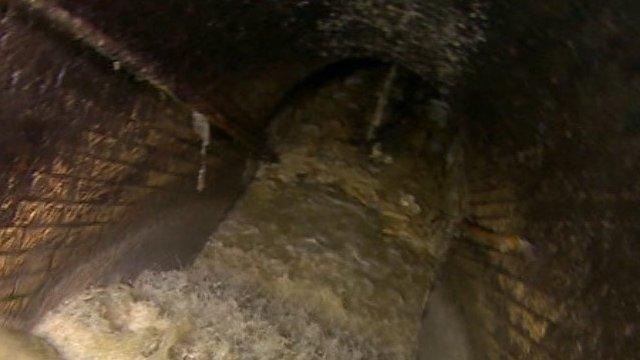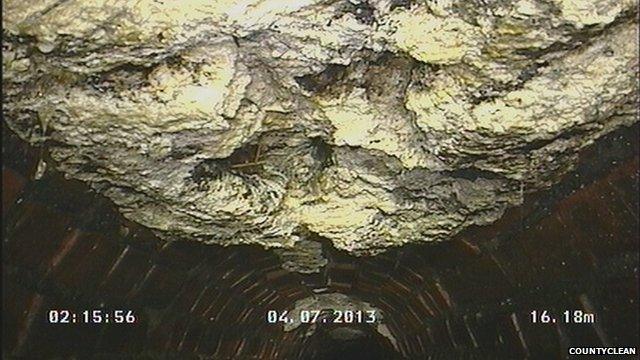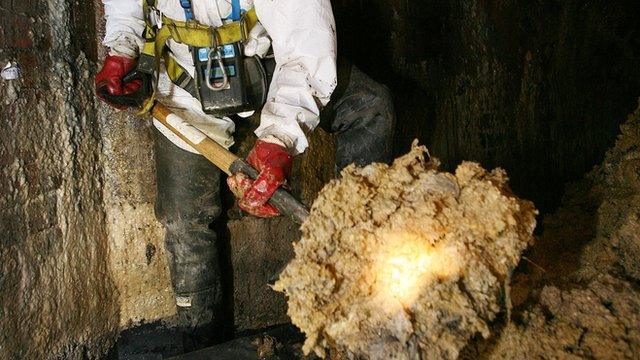Scottish Water warns householders over 'fatbergs'
- Published
There were more than 40,000 blockages in drains and sewers across Scotland last year
Scottish Water has urged householders not to pour fat or oil down their kitchen sinks after cooking Christmas meals.
It says congealed blocks of fat, oil and grease, known as 'fatbergs', block sewers and can damage pumping stations.
The largest fatberg in Britain, said to be the size of a bus, was found in a sewer in London.
Fatbergs are a problem throughout the year, but are a particular concern in the weeks after Christmas.
Scottish Water dealt with more than 40,000 blockages in Scotland's networks of drains and sewers last year, at a cost of more than £7m.
It estimated that 80% of incidents were caused by people putting the wrong things down their sinks and toilets.
Paul Severin from Scottish Water told BBC Scotland News: "Once the congealed fat gets into the main sewers, it builds up along with wipes and other items and can cause serious blockages.
"If the fat then gets into the pumps and the pumps fail, we can end up with a serious environmental issue with discharges into rivers or the sea."
The official advice is to leave fat, oil and grease to cool, scrape it into a sealable container and put it in the bin.
Some supermarkets are also offering customers free fat traps; plastic tubs with funnels which can be sealed before being disposed of.

FATBERG FACTS

Scotland has more than 30,000 miles of sewer pipes and more than 1,800 waste water treatment works.
Every year there are more than 40,000 blocked drains and sewers.
80% of blockages are caused by fat, oil or grease being put down the sink, or inappropriate items including baby wipes, sanitary items, cotton wool and condoms being flushed down the toilet.
Waste water drains from individual homes are only about four inches wide, less than the diameter of a DVD and are easily blocked.

But professional cooks say the old adage of waste not, want not still holds true.
Edinburgh New Town Cookery School Managing Director Fiona Burrell said: "Certainly for vegetable oil, which you may have been using to roast potatoes, you can strain that through a coffee filter or kitchen paper and put it into a bottle that you keep for used oil.
"If it is animal fat, like beef dripping, I would put that into a little pot, keep it in the fridge, and then use it again if you are roasting potatoes or other vegetables."
Meanwhile, conservationists have warned that fat left over from cooking Christmas meals should not be used to feed garden birds.
Chris Bailey from RSPB Scotland said: "The fat can actually have quite high salt content, which can be bad for the birds themselves.
"Secondly, the fat tends to be quite sticky and while it may provide good food, it can get onto the birds' feathers, which reduces insulation and also waterproofing."
The RSPB said it is better to use other foods, including boiled rice, cake crumbs, bread and bruised fruit to feed the birds.
- Published25 April 2014

- Published6 August 2013

- Published8 April 2013
